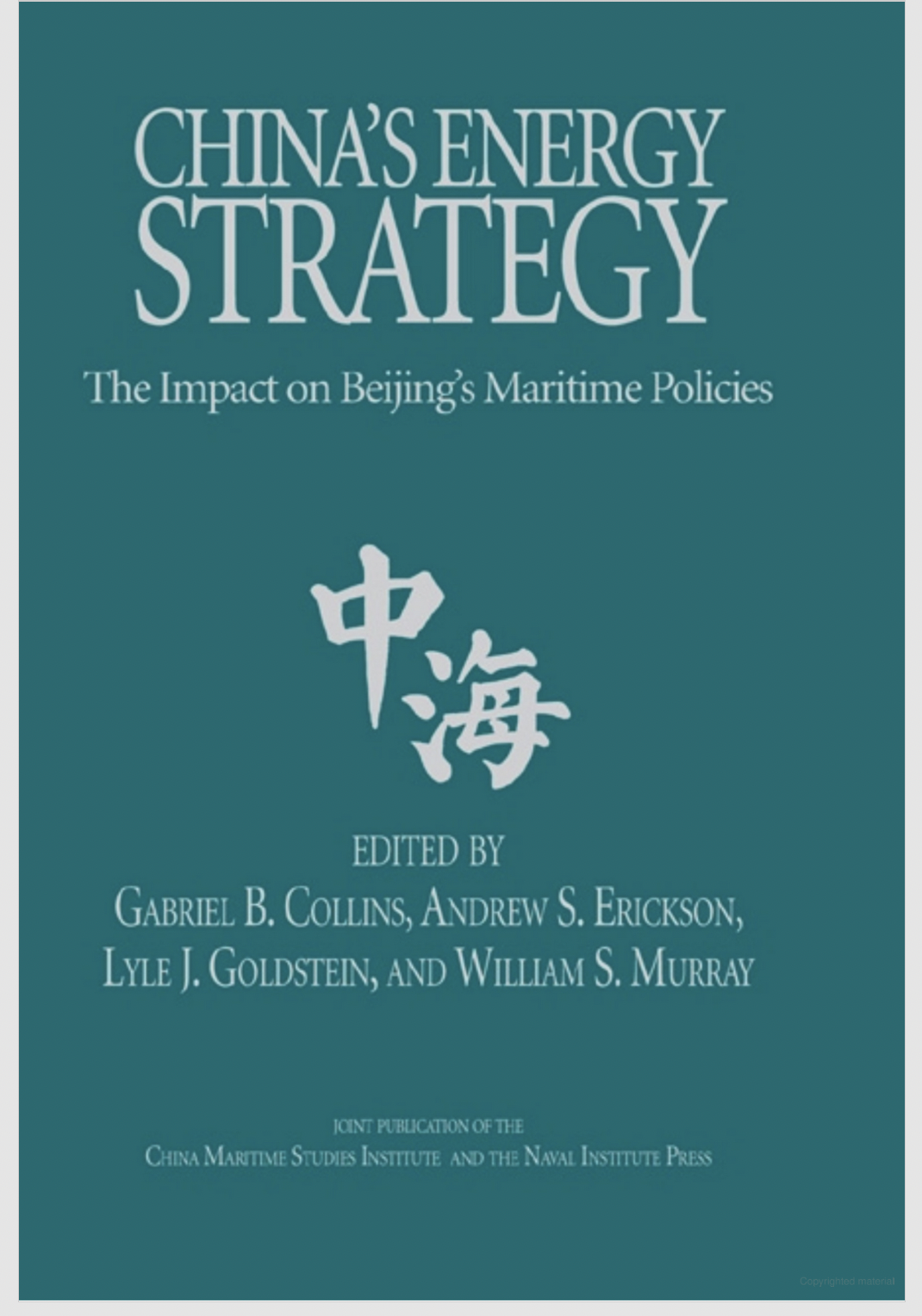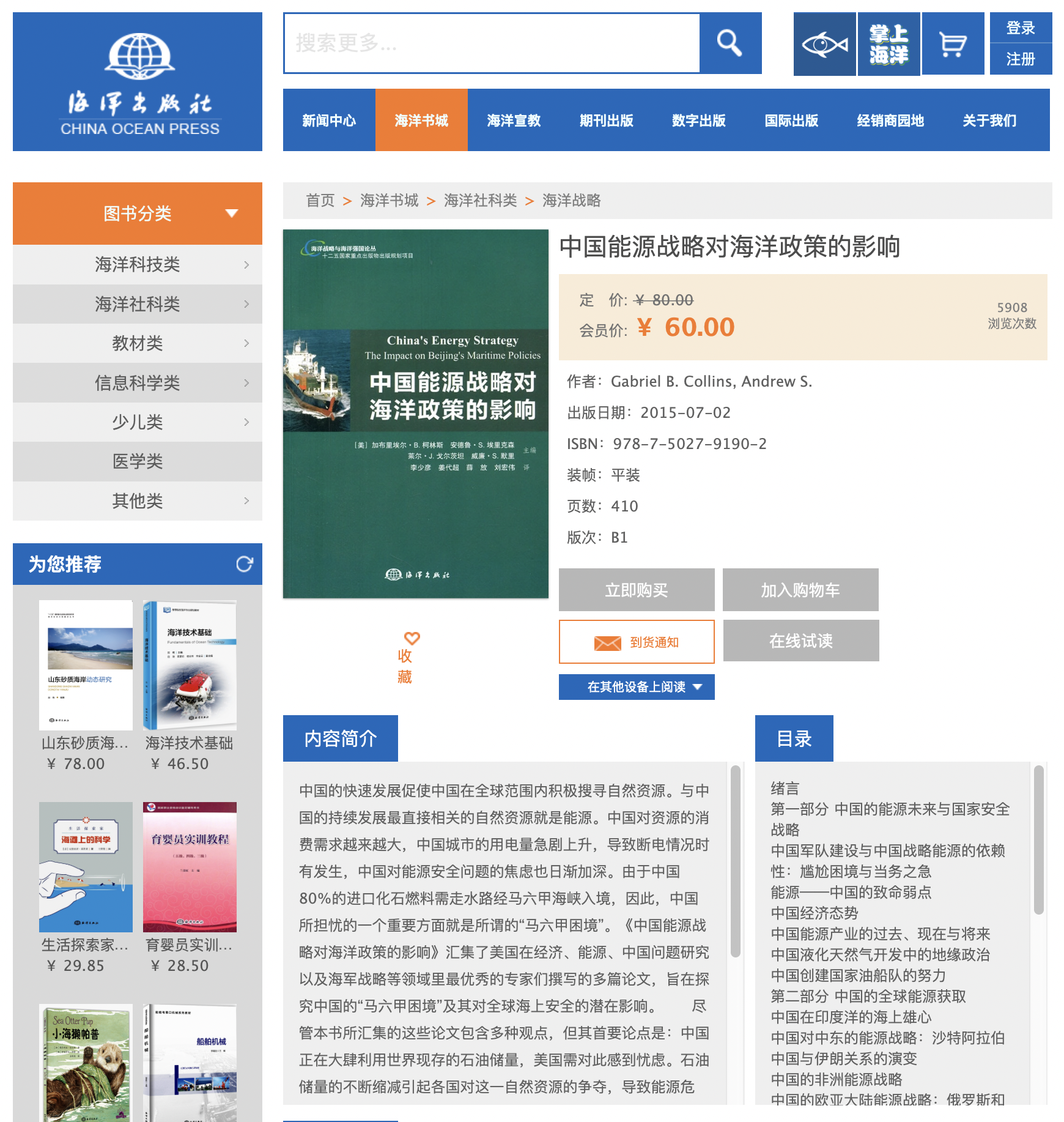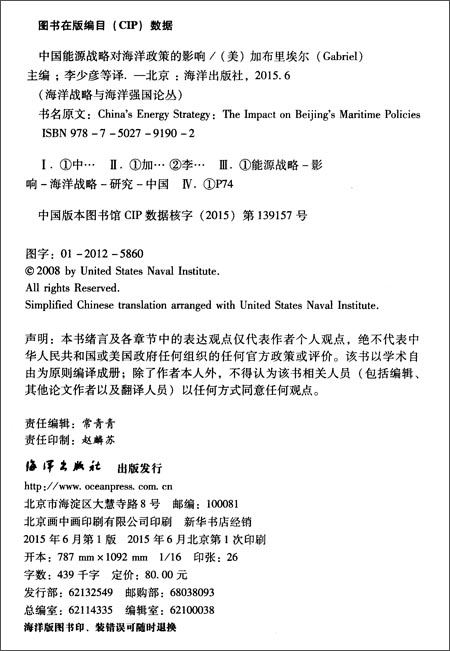China’s Energy Strategy: The Impact on Beijing’s Maritime Policies (CMSI Vol. 2)
Gabriel B. Collins, Andrew S. Erickson, Lyle J. Goldstein, and William S. Murray, eds., China’s Energy Strategy: The Impact on Beijing’s Maritime Policies (Annapolis, MD: Naval Institute Press, 2008).
- Now available on Kindle!
Coauthor:
- Gabriel B. Collins, Andrew S. Erickson, Lyle J. Goldstein, and William S. Murray, “Introduction,” xi–xix.
- Andrew S. Erickson and Gabriel B. Collins, “Chinese Efforts to Create a National Tanker Fleet,” 81–114.
- Andrew S. Erickson, Lyle J. Goldstein, and Gabriel B. Collins, “Chinese Naval Analysts Consider the Energy Question,” 299–335.
Authorized Chinese-language edition published in 2015 by China Ocean Press (oceanpress.com.cn):
- [美] 加布里埃尔·B.柯林斯 [Gabriel B. Collins], 安德鲁·S.埃里克森 [Andrew S. Erickson], 莱尔·J.戈尔茨坦 [Lyle J. Goldstein], 威廉·S.默里 [William S. Murray], 编者 [Editors]; 李少彦 [Li Shaoyan], 姜代超 [Jiang Daichao], 薛放 [Xue Fang], 刘宏伟 [Liu Hongwei], 译者 [Translators]; 中国能源战略对海洋政策的影响 [China’s Energy Strategy: The Impact on Beijing’s Maritime Policies], 海洋战略与海洋强国论丛 [Maritime Strategy and Maritime Great Power Forum Series], 十二五国家重点出版物出版规划项目 [Twelfth Five-Year Guideline State Key Publications Planning Initiative] (Beijing: 海洋出版社 [Ocean Press], 2015).
- “绪言” [Introduction]
- “中国创建国家油船队的努力” [Chinese Efforts to Create a National Tanker Fleet]
- “中国海军分析家关注的能源问题” [Chinese Naval Analysts Consider the Energy Question]
Japanese language summary translation now available: “書籍3: 中国のエネルギー戦略–北京の海洋政策への影響.”
SAMPLE CHAPTER: Dan Blumenthal, “Concerns with Respect to China’s Energy Policy,” 418–36.
China’s rapid growth has prompted Beijing to undertake an aggressive search for resources on a truly global scale. The resource most directly tied to continued growth in China is energy. Rising consumer appetites in China, coupled with occasional rolling blackouts due to spiraling demand in Chinese cities, have prompted intense anxieties in China concerning energy security. Since 80 percent of Chinese fossil fuel imports pass by ship through the Malacca Strait, an important component of Beijing’s concerns have come to be known in China as the “Malacca Dilemma.” This book draws on America’s finest experts in the fields of economics, energy, China studies, and naval strategy in order to explore China’s “Malacca Dilemma” and its implications for global maritime security.
The essays in this volume draw from a wide variety of viewpoints, but a central theme of the analyses is that the United States needs to be concerned that China is drawing upon much of the world’s remaining oil reserves for its exclusive use. The resulting competition for this diminishing resource could lead to energy insecurity and may support other tendencies toward rivalry that in turn could foster a naval arms race neither side seeks. One of the major conclusions of this study is that there is, in fact, ample room for Sino-American energy dialogue and cooperation in the maritime domain and that the competition for limited energy sources like oil need not lead to conflict.
The book’s authors are all authorities in their fields; many of the contributors are frequent advisers to major oil, shipping, and other multinational corporations, as well as governments. As a result, this volume takes into account an unprecedented range of influences and factors befitting such an important and complicated topic.
This is the second book in the series “Studies in Chinese Maritime Development” published jointly by the China Maritime Studies Institute and the Naval Institute Press.
BLURBS
“This book is a comprehensive assessment of China’s overall and maritime energy security strategies; as important, it provides clear and detailed guides to judge the nature of future Chinese naval developments and overall Chinese security strategy.”
—Admiral Dennis Blair, U.S. Navy (Ret.), former Commander, U.S. Pacific Command
“…a necessary read for anyone interested in the future of the People’s Republic of China’s energy development and its strategic implications for the U.S., with particular attention to maritime development in both countries. The book tackles the prospects for China’s energy development in a remarkably comprehensive, nuanced fashion. It evaluates Chinese perspectives and prospects, analyzes the PRC’s capabilities in each relevant global region, and dissects the PLA Navy’s capabilities with respect to energy security issues. The authors, including those writing for the final section, which analyzes the implications for U.S. policy, carefully identify inevitable uncertainties and analytical disagreements. On balance, the book stresses the room for U.S.-China energy cooperation in the maritime domain. Importantly, it provides the rich array of data and analysis necessary for readers to develop their own deeply informed perspectives on this issue.”
—Dr. Kenneth Lieberthal, Arthur F. Thurnau Professor of Political Science, University of Michigan and former Senior Director for Asia on the National Security Council
“Comprehensive, diverse and essential for national security professionals… a subject we must understand clearly for our Asia-Pacific future.”
—Admiral Thomas B. Fargo, U.S. Navy (Ret.), former Commander, U.S. Pacific Command
REVIEWS
“Good, deep background material.”
—James Caley, review on Amazon.com, 24 October 2017.
“The China Maritime Studies Institute… is fast becoming a center of excellence for research on all aspects of the Chinese navy. … all the contributions are excellent… The beauty of this book comes in different forms. As the editors indicate in their introduction, the contributors do not always agree. … Important statistics are also provided. …provides the latest scholarship. Further enhancing the book’s value is that the contributors are all actively involved in shaping this multifaceted debate in their respective institutions. … This reviewer could not exaggerate the importance of this book in understanding the issues shaping the development of the Chinese navy.”
—Richard Desjardins (Canadian civil servant), Joint Force Quarterly 57.2 (2010): 132-33.
“[the authors] have described the drivers of China’s quest for a limited power projection capability—and they did so well before Beijing’s December 2008 decision to deploy a series of task groups to the Gulf of Aden in order to protect shipping from an onslaught of pirate attacks. … This volume makes the case that Beijing’s desire to ensure steady and secure access to the energy resources required to continue the momentum of China’s economic growth will ‘compel the PLAN [People’s Liberation Army Navy] to be used increasingly in nonconflict situations in a wider variety of regions.’ The PLAN’s actions today certainly support this argument; Beijing’s naval task groups in the Gulf of Aden are operating thousands of miles from China to protect merchant shipping, much of which is transporting oil. … details how important maritime commerce is to China’s continued economic development.”
—Scott W. Bray (the U.S. Navy’s Senior Intelligence Officer for China), “Turning to the Sea… This Time to Stay,” Book Review Essay, Asia Policy 9 (January 2010): 167-72.
“…it is a relief to read a mass of carefully considered common sense such as is contained in this fine book. It is refreshing to be reminded that so many of America’s military, especially naval, intellectuals can be so clear headed and rational. …Defence planners and warriors who are currently or likely to be involved in the Indo-Pacific regions should study this book very carefully.”
—Ships & Shipping (July 2009): 38.
“…the book is superb, rich in information and subtle analysis, and should be of interest to all students of geopolitics.”
—Arthur Waldron, Pacific Affairs 82.2 (Summer 2009): 328-30.
“The importance of the energy factor in politics today can hardly be called into question. … How much does… energy affect… military doctrine? How does the energy vulnerability of the state influence the modernization of the army? As far as China is concerned, these questions are answered at the beginning of the complex research by Gabriel Collins, Andrew Erickson, Lyle Goldstein, and William Murray…. This approach makes the book… exciting reading and gives a lot of food for thought and discussion. The authors are fellows of the U.S. Naval [War] College and are famous for their studies on various aspects of China’s energy strategy, including its impact on [the] maritime strategy of the country.”
—Yevgeny Petelin, “Energy at the Edge of War and Peace,” Security Index 87.15 (Spring 2009): 147-49.
“The editors achieve their task of examining China’s energy security and naval modernization and their impact on Sino-American relations. …this book is highly recommended.”
—Andrew Forbes, International Journal of Maritime History (December 2008): 478-79.
“…this is an invaluable book for anyone wanting to understand China’s economy in general and its maritime strategy in particular.”
—David N. Griffiths, Canadian Naval Review 4.3 (Fall 2008): 42-43.
“a book that analyses the consequences of China drawing upon much of the world’s remaining oil reserves for its exclusive use is bound to raise the interest of the reader…. 20 renowned (U.S.) experts in the fields of economics, energy, sinology, and naval strategy analyse Chinese reactions to what they perceive to the ‘Malacca Dilemma,’ this book fascinates its reader … it is this mix expressed that makes the value of the book. It does not ‘con the reader into a conclusion,’ and knowing the Naval War College and the Naval Institute Press they do not attempt to do so. … readers and analysts should assess the diverse views expressed in the studies to come to personal conclusions… There are so many highly interesting topics discussed in the studies (which cannot all be listed even by headline only in this review…), that I can only recommend reading this book.”
—Wolfgang Legien, Editor-in-Chief, Naval Forces; former Director of Politico-Military Affairs, Supreme Allied Commander Atlantic, Naval Forces: The International Forum for Maritime Power 29.4 (April 2008): 146.
INFORMATION ON CHINESE-LANGUAGE EDITION
[美] 加布里埃尔·B.柯林斯 [Gabriel B. Collins], 安德鲁·S.埃里克森 [Andrew S. Erickson], 莱尔·J.戈尔茨坦 [Lyle J. Goldstein], 威廉·S.默里 [William S. Murray], 编者[Editors]; 李少彦 [Li Shaoyan], 姜代超 [Jiang Daichao], 薛放 [Xue Fang], 刘宏伟 [Liu Hongwei], 译者 [Translators]; 中国能源战略对海洋政策的影响 [China’s Energy Strategy: The Impact on Beijing’s Maritime Policies], 海洋战略与海洋强国论丛 [Maritime Strategy and Maritime Great Power Forum Series], 十二五国家重点出版物出版规划项目 [Twelfth Five-Year Guideline State Key Publications Planning Initiative] (Beijing: 海洋出版社 [Ocean Press], 2015).
Click here to purchase via Amazon.cn.
Click here to purchase via Dang Dang.
《中国能源战略对海洋政策的影响》从不同角度全面论述中国能源开发的前景,展望中国的未来,分析中国在全球各相关地区的影响,仔细研究中国海军在能源安全问题上所能发挥的作用。《中国能源战略对海洋政策的影响》的最后一章分析了中国能源战略对美国政策的影响。总体而言,《中国能源战略对海洋政策的影响》着重强调中、美在海洋领域进行能源合作的可能性,并为读者提供了深入探讨中国能源问题所必须的各种调查数据和分析报告。
编辑推荐
《中国能源战略对海洋政策的影响》由海洋出版社出版。
名人推荐
内容丰富,视角多样,是国家安全部门人员的必读图书……为了亚太地区的未来,我们必须准确理解该书的主题。
——托马斯·B·法戈(已退休) 美国太平洋司令部前司令官、海军上将
所有想要了解中国能源开发的未来及其对于美国而言的战略含义,又特别关注这两个国家的海洋开发状况的人,都有必要读一读《中国能源战略对海洋政策的影响》一书。该书从不同角度全面论述中国能源开发的前景,展望中国的未来,分析中国在全球各相关地区的影响,仔细研究中国海军在能源安全问题上所能发挥的作用。该书的最后一章分析了中国能源战略对美国政策的影响。总体而言,该书着重强调中、美在海洋领域进行能源合作的可能性,并为读者提供了深入探讨中国能源问题所必须的各种调查数据和分析报告。
——肯尼思·利伯索尔博士 亚瑟·F·图尔瑙 美国国家安全委员会亚洲局前局长、密歇根州立大学政治学教授
该书对中国的总体和海上能源安全战略做了全面的评估。重要的是,该书为我们判断未来中国海军发展和中国总体安全战略的性质提供了明确而又详细的指导。
——丹尼斯·布莱尔(已退休) 美国太平洋司令部前司令官、海军上将
作者简介
作者:(美国)加布里埃尔·B.柯林斯(美国)安德鲁·S.埃里克森 (美国)莱尔·J.戈尔茨坦 (美国)威廉·S.默里 译者:李少彦 姜代超 薛放 刘宏伟
目录
绪言
第一部分中国的能源未来与国家安全战略
中国军队建设与中国战略能源的依赖性:尴尬困境与当务之急
能源——中国的致命弱点
中国经济态势
中国能源产业的过去、现在与将来
中国液化天然气开发中的地缘政治
中国创建国家油船队的努力
第二部分中国的全球能源获取
中国在印度洋的海上雄心
中国对中东的能源战略:沙特阿拉伯
中国与伊朗关系的演变
中国的非洲能源战略
中国的欧亚大陆能源战略:俄罗斯和中亚
中国东海的主权纷争
中国、南海和美国战略
第三部分中国海军与能源通道相关的发展和重要问题
中国海军分析家关注的能源问题
中国海洋战略中的能源因素
中国的水面作战单位和推动新型海上交通线防御的必要性
封锁战略的比较历史学研究
中国无油可用
第四部分中国能源安全与美中关系
中国海军现代化建设:对美国海军必备能力的潜在影响
关注中国能源政策
具有中国和美国特色的能源不安全感:现实与可能
索引
文摘
中国的快速发展促使中国在全球范围内积极搜寻自然资源。与中国的持续发展最直接相关的自然资源就是能源。中国对资源的消费需求越来越大,中国城市的用电量急剧上升,导致断电情况时有发生,中国对能源安全问题的焦虑也日渐加深。由于中国80%的进口化石燃料需走水路经马六甲海峡入境,因此,中国所担忧的一个重要方面就是所谓的“马六甲困境”。《中国能源战略对海洋政策的影响》汇集了美国在经济、能源、中国问题研究以及海军战略等领域里最优秀的专家们撰写的多篇论文,旨在探究中国的“马六甲困境”及其对全球海上安全的潜在影响。 尽管本书所汇集的这些论文包含多种观点,但其首要论点是:中国正在大肆利用世界现存的石油储量,美国需对此感到忧虑。石油储量的不断缩减引起各国对这一自然资源的争夺,导致能源危机,并有可能加剧其他对抗趋势的形成,而这反过来又可能引发各方均不愿看到的海军军备竞赛。本书的一个主要结论是:实际上,中美能源对话及海洋领域合作的空间广阔,而且对子像石油这样有限能源的竞争不必导致冲突。 本书的各位作者加布里埃尔·B.柯林斯、安德鲁·S.埃里克森、莱尔·J.戈尔茨坦、威廉·S.默里均为其各自领域里的权威人士,其中许多人经常为主要石油公司、航运公司和其他跨国公司以及政府部门提供咨询。因此,本书所探讨的这种重大而复杂题材应产生的影响之广,应包含的要素之多,都将是前所未见的。
版权页:
不过,天然气工业以及全球液化天然气贸易和市场所具有的一些特点表明,它们的的确确在将重要的战略考量引入液化天然气市场与投资。有种观点认为液化天然气贸易比石油贸易要“垂直”得多(即,液化天然气贸易价值链条的所有环节在大型综合性项目中都是紧密相连的,需要有政府的强力支持)。与石油不同,液化天然气与天然气相比运输成本相对来说非常高,这大大增加了液化天然气资本投资的风险,并且成为国家介入以及国与国之间进行交易的强大动力。即使用资本高度密集型的全球能源工业的标准来衡量,液化天然气项目上的投资是巨大的,并且要求下列各项行动同步进行:投资、进行巨额跨国融资、向多国借贷机构贷款以及签订通常长达25年的期限非常长的合同。从生产阶段的气门驱动链条,到油轮运送至再气化的工厂,再到天然气终端消费者,液化天然气的每一个环节都紧密相连。这就要求政府战略性地参与到生产者和消费者之中。绝大多数合同包括繁多的“照付不议”条款,因此无论液化天然气买家们是否需要天然气,他们都被要求承诺在灵活处理购买量方面的苛刻的限制条件。在一个阶段受到削减的采购被要求在后续的阶段以更大的采购量来弥补。此外,天然气终端消费者市场的发展以及处于上游的项目所在国政府的介入使得液化天然气生意非常“受制于政治”(例如,严重地依赖一个可靠的、延续性的和透明的政府在终端用户市场中改进天然气需求的政策)。所有这些特点汇合在一起就给液化天然气行业增添了强有力的政治和政府因素,这个行业使得中国从长远来看不断增长的对液化天然气的依赖不仅仅限于市场这一个因素。








































